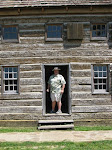Fifty years ago today I received my B.A. (American History) from the University of Maryland in College Park. There were several thousand degrees conferred that day in the sober atmosphere of Cole Field House. Robert F. Kennedy had been murdered in Los Angeles two days earlier. Martin Luther King Jr. died at the hands of an assassin in early April. Our commencement speaker, James B. Reston, Executive Editor of The New York Times, delivered an address for hope couched in terms of the difficulty and challenge facing the American experience and its response to the war in Vietnam, its most serious internal struggle since the Civil War a century earlier.
In 1968 I had not yet formed a strong opposition to our nation's war against communist influence in Vietnam. My focus that summer targeted a new and narrow direction in behavioral studies involving geography, cartography and psychology. It was a full and exciting challenge for any first-year grad student. By early 1969 with no end in sight for what appeared to be a hopeless war many friends immersed themselves in radical politics. I watched from the sidelines until my closest friend, a brilliant mathematician, elected to leave the country rather than face the increasingly troubling national crisis unfolding on the home front. The day before he left he asked if I could drive him to his family home in the idyllic farm country near Emmitsburg. He wanted to say "good-bye". For an hour I sat alone and quiet in an overstuffed chair in a comfortable, dimly lit parlor straight out of 1910. On the return to Washington not a word was shared between us. It remains one of my strangest and darkest days. It was also the last day of my support for a military solution in Vietnam. The following day, Dave and his girlfriend left for Canada. I never heard from them again.
Today is very much like June 8, 1968 when James B. Reston explored the expression of hope in the face of adversity across 4000 years. So it remains for us to see how we manage our national maturity and our nation's place in the great chain of being.

No comments:
Post a Comment